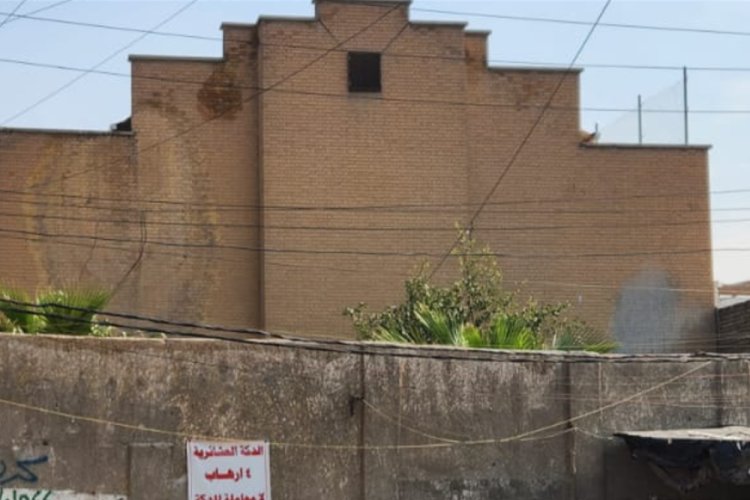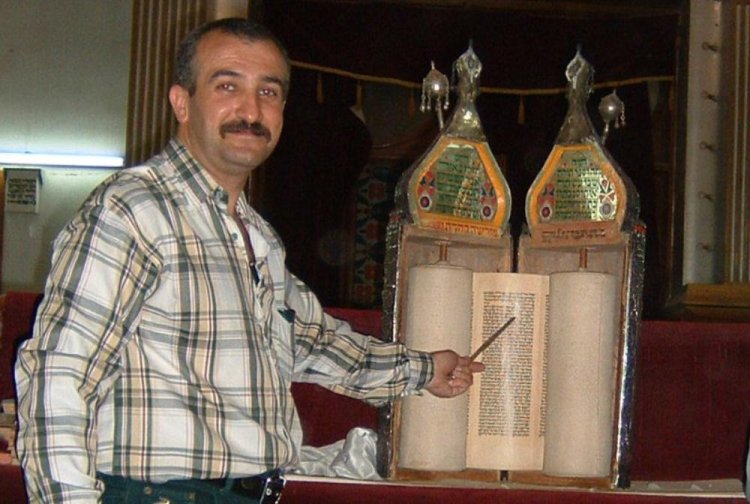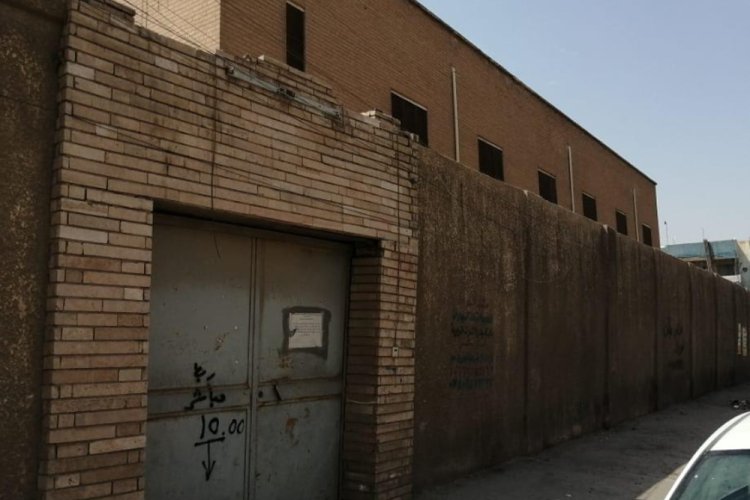The Last Jewish Emigrant from Iraq: "Saddam's Intelligence Agents Hunted Me"
Emad Levy, the last Jew to emigrate from Iraq, still remembers the days and nights under Saddam Hussein's oppressive regime: "He turned all the synagogues into garbage dumps."
 Illustration. Inset: Emad Levy
Illustration. Inset: Emad LevyDusk fell over the sky of Iraq as Emad Levy stood at the entrance of the Mukhabarat building, the intelligence service of Iraqi President Saddam Hussein. He looked around cautiously and then disappeared into the somber gloom that had enveloped the dark and grim intelligence offices.
The darkness loomed through the narrow glass windows of the Mukhabarat offices. Armed guards patrolled the winding corridors, and the walls were "adorned" with portraits of the merciless dictator Saddam Hussein. Levy walked swiftly, slipping silently into one of the rooms moments later.
"I want to leave Iraq," he whispered to the intelligence agents seated across from him. They looked at him smugly, sipping steaming coffee whose strong aroma wafted through the room. "Why would you want to leave, Emad?" they mocked, lighting themselves a suffocating cigarette. "Life here is beautiful, isn’t it?"
Levy was undeterred. For a long period, he repeatedly tried to get the highly coveted clearance for leaving Iraq. During one of those meetings, the intelligence agents formally told him: "It’s not going to happen. Forget about it."
A One-Man Battle
Emad Levy, 60, was born in Iraq and is now an Israeli citizen. His story is a unique tale of personal Jewish independence. He was among the few Jews left in Iraq for many years and later became the last emigrant from the country. His powerful story is intertwined with long moments of fear and terror.
"Life in the country was beautiful," Levy recounts. "We had large, luxurious homes, and a warm, homely atmosphere. The economy was at its peak, and food was cheap and abundant."
However, with Saddam Hussein's rise to power, life changed dramatically: "He looted most of the Jewish community's property. The citizens all feared him and his regime. Saddam was wicked, an especially evil and cruel personality. Even his own guards were scared, trembling in front of him despite being proven criminals themselves."
By the early seventies, not many Jews remained in Iraq. Around that time, Rabbi Sassoon Kedouri z”l, the last chief rabbi, passed away. Out of the many synagogues that were scattered throughout Iraq, only one, "Meir Twigg," remained open, located in the Al-Batawin neighborhood of eastern Baghdad. "Saddam Hussein turned most synagogues into garbage dumps," Levy painfully describes. "Some were nationalized by the state and turned into residential centers or shopping malls."
Levy was in charge of the operation and maintenance of the "Meir Twigg" synagogue, ensuring its order and cleanliness. Over the years, the Jewish community dwindled, with some members passing away and others making their way to Israel by various means. Levy remembers the last prayer held with a minyan: "Afterward, I locked the synagogue and appointed a guard to watch it day and night. I furnished him with a weapon, issued him a license, and since then, he has been guarding it faithfully."
 The 'Meir Twigg' synagogue in Baghdad (Photo: Benny Waxler
The 'Meir Twigg' synagogue in Baghdad (Photo: Benny WaxlerWhy guard it?
"To prevent it from being looted, and to avoid what happened to the other synagogues in the country. The 'Meir Twigg' synagogue houses ancient Torah scrolls, with the oldest being over two hundred years old. It is a place that requires constant protection and security."
 Levy with one of the ancient Torah scrolls in the synagogue, photo from 1988
Levy with one of the ancient Torah scrolls in the synagogue, photo from 1988Personal Persecution
Levy worked in the local Baghdad market, and he claims everyone knew he was Jewish. "I never hid my faith, and that's why they respected and appreciated me. All the merchants preferred to do business with Jews first because they knew Jews were honest and not liars."
Meanwhile, Levy organized private aliyah operations for local Jews together with the Jewish Agency. "Everything was done in coordination with the authorities," he declares. "I would obtain official visas for them, authorizing their departure from the country, and then flew them to Jordan and from there to Israel or other destinations."
Didn't you want to leave yourself at some point?
"I did," Levy states. "Our community was dwindling, and only unmarried men remained. I myself did not marry because there were no Jewish women left in the community. I understood that if I wanted to start a family, I needed to leave soon and make aliyah."
So why didn't you leave?
"When I decided to make aliyah, Saddam Hussein's intelligence service personally hunted me. For all the Jews I helped make aliyah, they issued visas, but they refused to issue one for me. I would return to them repeatedly, trying to obtain the much-desired visa. I pleaded, begged, and did everything for them to permit me to leave—until one day I was formally told to forget about it."
Why were they particularly after you?
"Because I was the most active figure in the Jewish community, responsible for all local religious activities. I was the synagogue's gabbai, the shochet, and even the burial manager for departed community members. To them, I was an existential challenge, and keeping me confined to Iraq was their revenge."
 The 'Meir Twigg' synagogue (Photo: Mohammed A. on behalf of Yitzhak Carmeli
The 'Meir Twigg' synagogue (Photo: Mohammed A. on behalf of Yitzhak CarmeliAlone in Jordan
In March 2003, the U.S. Army invaded Iraq, together with military forces from other countries, and engaged in a war against the Iraqi army. After three weeks of intense fighting, Saddam Hussein's brutal regime was overthrown. The dictator was captured by American forces several months later, brought to trial, and ultimately executed by hanging in late 2006. This marked the end of the formidable Iraqi intelligence service.
You got the chance you were hoping for, to leave Iraq.
"Correct," Levy affirms. "But the new militias that took over Iraq were no less vicious, and they probably had learned of my plan to leave the country. One evening, an anonymous note was slipped under my door reading, 'Leave Iraq, and don’t sell the house. If we find out you sold it, we will kill you.' They intended to loot all my belongings."
In 2010, Levy received the much-coveted visa. He left his belongings behind and flew to Jordan with the intention of flying directly to Israel. "It was on the eve of Rosh Hashanah. When I boarded the plane, I was confident I would celebrate the holiday in Israel," he recalls, "but I ended up stranded in Jordan for three weeks."
Levy describes how his days and nights in Jordan became unbearable. "I had to report daily to Jordanian intelligence for a long and grueling interrogation," he recalls. "Their aim was to break me, thus compelling me to return to Iraq and preventing me from making aliyah to Israel."
What was the reason for your interrogation and detainment?
"Jordanian intelligence was confident that Israel wouldn’t intervene due to the peace agreement between the two nations. I felt they permitted themselves to do as they pleased with me, not fearing they’d have to answer for their actions."
Levy endured nightmarish days and nights. He spent Rosh Hashanah in a Jordanian hotel, and unfortunately, also Yom Kippur. "I will never forget that Yom Kippur," he says painfully. "I didn’t have a siddur, only a tallit I had brought from Iraq. It was the first time in my life I fasted without praying Yom Kippur prayers."
My Independence Day
After intervention by the Israeli embassy in Jordan and the personal involvement of former minister Mordechai Ben-Porat z”l—previously in charge of leading Iraqi Jews to Israel on behalf of the Mossad—Levy was granted the Jordanian visa enabling his aliyah to Israel. Levy remembers every moment of his personal Independence Day: his last look at Jordan, the takeoff, the flight, and the emotional landing in Israel. He integrated into the center of the country, married, and started a family. "That was something I could only dream of in Iraq," he says with excitement.
What message would you like to conclude with?
"In Israel, I feel Jewish," Levy states. "In Iraq, I was of course Jewish, but I was a lonely Jew. Here, the atmosphere is different and unique: everyone feels like one family, and this family can never be separated."

